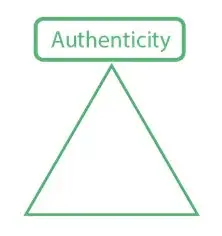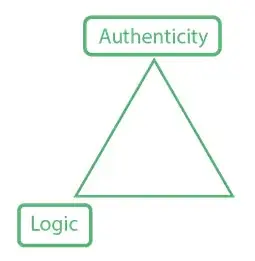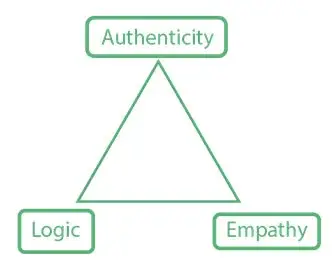FAMILY RECOVERY
You can listen to the audio version of this article:
Trust Triangle
One of our most common, and nefarious problems we experience in our clinical work at CeDAR is that of broken trust. We hear repeated stories of how families no longer trust a child, spouses distrust each other or a patient struggles to trust his or her treatment team. As trust becomes strained, so many difficult emotions trickle down, leading to themes of fear, agitation, and functional impairment.
Clinical care mentions trust as one of the principal ingredients by which a therapist helps someone. This is a ‘therapeutic alliance.’ In many ways, the presence (or absence) of such an alliance will predict the outcomes of someone’s treatment. When we experience a strong alliance, we are able to challenge people in a positive fashion. Even if ideas or emotions are difficult, the alliance keeps the dialogue going, rather than falling apart.
We often talk about trust, but sometimes have a difficult time breaking this down into components. The goal is not unique to behavioral healthcare, also being discussed in the corporate industry. Over this past year, we have seen trust breakdown in banks, ride-sharing companies, and social media companies. These entities have employed strategies to rebuild trust with varying degrees of success.
From an organizational theory, trust is present through 3 core ingredients:
- Authenticity
- Stable and Sensible Logic
- Empathy
Authenticity
When many of our patients and families report issues with trust, we can trace this back to patterns of feeling deceived or that the person (often drinking or using drugs) was not being their authentic self. This lack of authenticity makes us feel confused and skeptical of the beliefs and intentions of the other person. Because so many people require a basic sense of safety in relationships, impaired authenticity makes a sense of safety feel limited.
It’s also possible for a clinician to struggle with authenticity. They may present as highly guarded, anxious or confused. This is especially true for therapists who are deeply affected by a patient’s story, sometimes having lived it themselves. This lack of therapeutic alliance can create an unsafe space for clients. The problem needs processing through the supervision of that healthcare provider.
It is important to acknowledge that a clinician can maintain firm boundaries and privacy while still behaving in an authentic way. We have many patients who ask personal questions of therapists and expect that they will receive an answer, which is very often incorrect. This holding of boundaries can be effectively maintained while behaving with authenticity.
If you are looking to heal trust within your family, a good place to start is that of authenticity. People in recovery are being authentic when they communicate emotions or reach out for help. There is some inherent irony in this: a person who represents strength may paradoxically be less trustworthy. Vulnerability and authenticity will strengthen trust.
Does your loved one need rehab?
Stable and Sensible Logic
Many of our patients at CeDAR are looking to us for expertise and guidance. We build trust by showing them, in a logical fashion, a plan of action or idea. If we are making recommendations to others while not describing the background behind the recommendation, it can be difficult to take the clinician seriously.
The same is true with family members developing their own plan for recovery, but failing to acknowledge the illogical traits of this plan. If someone is graduating from treatment and moving back in with their addicted girlfriend without realistic healing, the plan sounds illogical. If your situation requires the rebuilding of trust, make sure that you can thoroughly and sensibly describe your way of thinking to loved ones. The more thoughtful you are, the more it builds trust. The more illogical the plan, the less likely it will lead to family healing (or stable recovery).
Open-mindedness about planning is highly important. Being able to ponder different ideas builds trust because this is an important step in sound logic. People closed off to alternative ideas may have issues with core logic. It is important to be flexible to new ways of thinking.
Empathy
Perhaps one of the most important ingredients in trust is empathy. Empathy involves paying attention to someone in a nonjudgmental way. It involves imagining and validating that other person’s point of view. Through empathy, we help others know that they are important to us and we are willing to give our time and energy to what they have to say.
When people are struggling, their ability to give empathy often goes down. An emotionally sick person, such as someone with severe depression or addiction, becomes self-focused. This act of being overly attendant to one’s self can come at the expense of relationships. Many people talk about the need for empathy from a clinician, but it is rarely discussed as a deficit within the patient.
Another way of describing this is within a family system. If someone is chronically impaired, either through mental illness or substance intoxication, that person cannot effectively be there to meet the needs of the other family members. They don’t have the ability to stay present or actively listen to the rest of the families’ problems. Instead, they require empathy from the family. This entire pattern contributes to some of the lack of trusting that individual.
It is important to find ways to give empathy back to loved ones once healing begins. If you are someone healing from an issue like alcoholism, make a conscious effort to emotionally give to others when you are feeling more stable. This does not mean fixing or solving other people’s problems. It means staying present and listening nonjudgmentally. This serves two wonderful purposes: being there for others when they need support and rebuilding trust from others of your own health.
Final Thoughts
Talking openly about trust is important because these issues are so prevalent with addiction and mental health. The above trust triangle is a useful framework to deepen such a discussion. Our clinical program at CeDAR focuses heavily on family healing, and the use of such tools can make family therapy more productive. The addiction cycle can injure each of these variables. By identifying them and consciously rebuilding each variable, families can feel the quality restoration of trust.



